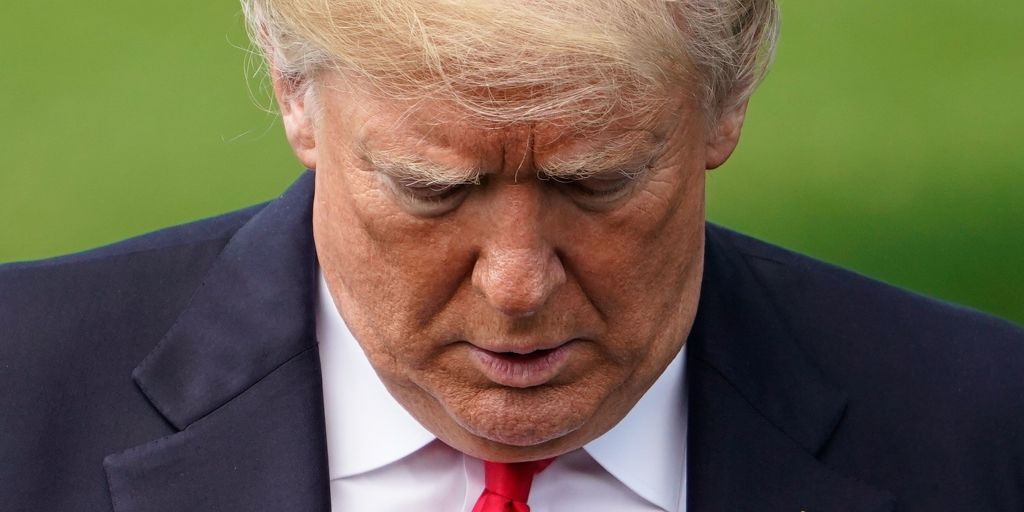Donald Trump will be the first impeached president to run for re-election in United States history. While the outcome of that election is still unknown, past impeachments offer ideas about the short- and long-term aftermath of Trump’s impeachment.
Three American presidents – Andrew Johnson in 1868, Bill Clinton in 1998, and Trump in 2019 – have now been impeached by a majority vote of the House of Representatives. One other president – Richard Nixon – would have been impeached if he had not resigned in 1974.
However, no president has ever been convicted and removed from office by the required two-thirds vote of the Senate, and all impeachment votes in both the House and the Senate have been overwhelmingly partisan.
Johnson’s Impeachment: No Long-Term Damage
In 1868, Johnson became the first American president to be impeached. Johnson was a Tennessee Democrat who had opposed his own state’s secession to join the Confederacy and preserve slavery.
Republican President Abraham Lincoln had chosen Johnson as a vice-presidential candidate in the 1864 election to try to unify supporters of the war effort from both parties. When Lincoln was assassinated, Johnson became the surprise president.

While Johnson supported efforts to end the Confederate rebellion, he favored quick reconciliation with political leaders who had rebelled and the restoration of white social and political supremacy throughout the South, even if slavery had been abolished. Northern Republicans were mostly horrified by Johnson’s positions, and their coalition was abandoned.
The U.S. Constitution requires Senate approval of any presidential appointment to the Cabinet, but says nothing about the process to remove such officials. So in 1867, Congressional Republicans passed the Tenure of Office Act, overriding Johnson’s veto, to require Senate approval to fire a Cabinet member.
Johnson subsequently fired Secretary of War Edwin Stanton who opposed Johnson’s policies toward the South. The House of Representatives on a mostly partisan basis then voted to impeach Johnson. After a Senate trial, the vote to convict and remove Johnson fell one vote short.
When the Supreme Court ruled in 1926 that later versions of the Tenure of Office Act were unconstitutional, Johnson seemed vindicated by history. But in recent years, American sympathies for the cause of Confederate rebels have dwindled, and Johnson’s racist beliefs are no longer acceptable.
In addition, there is abundant evidence that Senators on both sides were bribed for their votes. Today, many historians would no longer consider a vote against Johnson’s conviction as a “Profile in Courage,” as John Kennedy once did in his famous 1955 book.
Johnson’s impeachment also did no political damage to the Republicans who prosecuted him, as they continued to dominate American presidential and Senate elections for several decades.
Nixon’s Almost-Impeachment and Poor Reputation
In 1974, 106 years after Johnson’s impeachment, Nixon resigned to avoid impeachment.
In the summer of 1972, five burglars were discovered at the Democratic Party’s national headquarters at the Watergate building complex in Washington D.C. The burglars worked for Republican President Nixon’s campaign organization.
Nixon claimed he was unaware of the activities, and most Americans believed him. In November that year, he won re-election in a landslide. But early in his second term, one of the burglars went public with accusations that top Nixon campaign officials were involved with the efforts to plant bugs at the Democratic Party headquarters.
The investigations that followed revealed the existence of a White House Plumbers group, who had bugged offices in the White House and of Nixon’s opponents. It also uncovered a campaign slush fund, where millionaires gave secret illegal campaign donations to fund the White House Plumbers and “hush money” to keep the Watergate burglars quiet before the 1972 election.
At first, none of the investigations revealed direct evidence of a crime by Nixon, who admitted no wrongdoing for months. Finally, a former White House employee revealed that part of his job had been to maintain tapes of Nixon’s private conversations in the Oval Office. Nixon had planted bugs in his own office to use the stored tapes when he wrote his memoirs after leaving office.
For months, Nixon refused congressional and prosecutor requests to turn over the tapes, until in July 1974, the House of Representatives Judiciary Committee voted to recommend Nixon’s impeachment to the full chamber.
The Supreme Court also ruled unanimously that Nixon had to turn over certain tapes for use at the trial of the Watergate burglars. On one of those tapes, Nixon was heard planning to get the CIA and FBI to block an investigation of the Watergate burglary.
Nixon’s interference with a criminal investigation, or obstruction of justice, was clear evidence of a crime, and House Republicans announced publicly they would vote to impeach, while Senate Republicans told Nixon they would vote to convict and remove him. Nixon resigned immediately.
In the aftermath, Nixon’s reputation continues to be very poor, and he is usually ranked among academics and the public as being among America’s worst presidents, though some of his policy achievements are remembered more fondly.
In the short term, Democrats won congressional elections and the next presidential election. But by 1980 and afterward, Republicans made gains, winning the following three presidential elections, and creating a Senate majority for six years.
The ability of Republicans to quickly rehabilitate their public image was perhaps helped by the Republicans willing to challenge their own president for his crimes.
Clinton: Mistake to Impeach?
Two decades after Watergate, President Clinton became the third president in U.S. history to face the impeachment process.
In 1994, Paula Jones filed a sexual harassment lawsuit against President Clinton for an alleged incident that had occurred in 1991 when Clinton was Arkansas Governor and Jones was a state employee. In 1997, the Supreme Court ruled unanimously that this lawsuit could proceed while Clinton was president.
At a pre-trial deposition in January 1998, Jones’ lawyers asked Clinton if he had ever had sex with a White House intern named Monica Lewinsky. The attorneys had heard rumors of their affair and wanted to prove a pattern of Clinton’s sexual harassment of female employees. Under oath, Clinton said he had not had sexual relations with Lewinsky, thereby committing perjury. Lewinsky also lied under oath.
With a 21-year divide, partisanship is one of the biggest differences between the Trump and Clinton impeachment trials. @usatgraphics takes a look at how they compare. https://t.co/1xro8lwCdD
— USA TODAY (@USATODAY) February 7, 2020
Prosecutors began to investigate allegations of perjury against the president. They went after Lewinsky, threatening to charge her with perjury until she admitted the affair and provided physical evidence of her sexual relations with Clinton. At an August 1998 grand jury hearing to investigate the president’s January 1998 perjury, Clinton again lied under oath about his sex with Lewinsky.
Later that year, the Republican majority House of Representatives voted to impeach the president for perjury before the grand jury and for telling others to lie, but the Senate failed to convict and remove Clinton at its 1999 trial, with all Senate Democrats voting against conviction and removal.
For the two decades after that, most political observers and Washington insiders considered it a political mistake to try to remove a popular president at the time of a strong economy. This attitude helped to cause delays in more recent attempts to impeach Trump. However, less than two years after the Senate trial, Clinton’s Democratic Vice President Al Gore lost a very close election that he should have won, and Republicans continued to control Congress for another six years.
Hillary Clinton lost two presidential elections partly due to negative public perceptions of her character from her husband’s presidency. And the #MeToo movement of the past few years has caused Clinton’s popularity to be re-evaluated, along with any acceptance of the idea of an older powerful man propositioning or engaging in sexual relations with young female employees.
Support for Clinton in the late 1990s did not seem to damage Democrats politically in the short term, but the long-term perspective has not been as generous.
Trump: Historical Reputation Will Suffer
Which brings us to the impeachment of President Trump. It is important to remember the context under which the House of Representatives voted to impeach the president last December.
Revelations during and after the 2016 presidential campaign indicated that Trump’s campaign staff was aware that Russian agents had stolen Clinton campaign emails that were then being released to Wikileaks and published online. And the president’s son, son-in-law, and campaign manager had all attended a meeting with a Russian agent at Trump Tower to get more information from the stolen Clinton campaign emails.
By the time the report from Special Counsel Robert Mueller was released in April 2019, several campaign officials had already pleaded guilty for lying to investigators, and Trump’s personal attorney Michael Cohen was about to go to prison, in part for arranging “hush money” payments to women such as Stormy Daniels who had claimed extramarital affairs with Trump before his election as president.
However, the Mueller Report indicated no clear crimes involved with the campaign collusion with Russians in 2016, though did note ten instances of Trump interference with the investigation.

When Democrats in Congress learned about Trump’s July 2019 phone call with Ukraine’s president, they had already been searching for grounds on which they thought they could successfully impeach Trump.
During that phone call, Trump discussed U.S. military aid for Ukraine and then asked President Volodymyr Zelensky to investigate a discredited conspiracy theory that Ukrainians were involved with stealing the Clinton campaign emails in 2016 and to investigate the Biden family with false claims that Joe Biden wanted a Ukrainian prosecutor fired to end an investigation of Biden’s son (who was not being investigated). On the same day as the phone call, orders were distributed in the administration to suspend aid to Ukraine.
As with all past presidential impeachment processes, the president denied any guilt or wrongdoing for months, and Congressional members of the president’s party mostly rallied around the president, defending him by any means possible. The House of Representatives impeached Trump in December by an almost completely party-line vote, but the Senate failed to convict and remove Trump, with only Senator Mitt Romney crossing party lines.
In the short term, with a strong economy, it’s possible that American voters will not punish Republicans for support of the president, and the impeachment may potentially have little impact on the November elections. Donald Trump is extremely popular with millions of Americans.
But in the long term, every impeached president’s historical reputation has suffered. Johnson and Nixon do poorly in any ranking of American presidents, and Clinton’s popularity is no longer what it used to be. If the United States remains the Constitutional democracy it is today, it is more likely that Trump’s and his supporters’ historical reputation will suffer.
If any ambitious future politician decides to write an updated volume of Profiles in Courage, it is likely to be Romney who gets featured, and not the 52 Senate Republicans who voted against convicting the president, even when several of those Republicans conceded that the accusations against Trump were accurate.
Disclaimer: The views and opinions expressed here are those of the author and do not necessarily reflect the editorial position of The Globe Post.





















